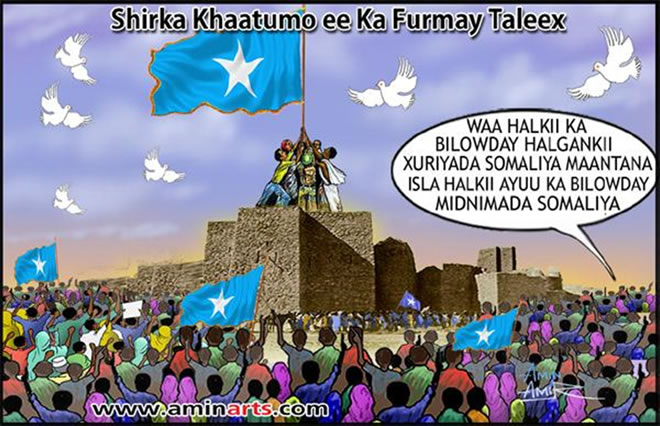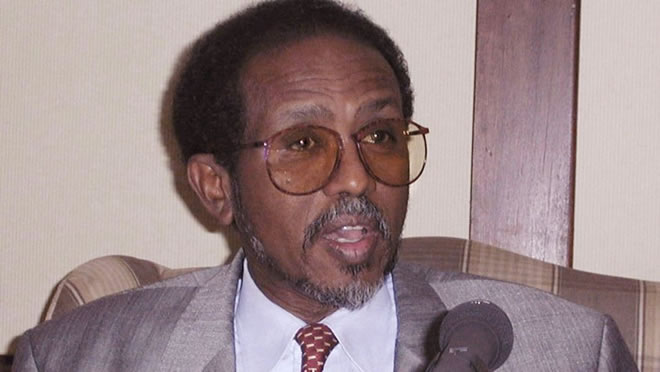Dr. Ali Khalif Galaydh passed away on 8 October 2020 in Jigjiga after spending nearly three years in Hargeisa waiting for Somaliland’s leaders to honor the peace agreement he signed with Silanyo, the former president of Somaliland. Hargeisa, the capital of Somaliland, was the last train stop in his long and eventful life before succumbing to the deadly Covid-19 that threatens to wipe out humanity from a planet that has recently been afflicted with many conflicts, natural disasters, and climate change.
Jigjiga is an ancient city that symbolizes the struggle of Somali freedom fighters against Ethiopian hegemony. Dr. Galaydh’s move to the city of warriors and his meeting with the leaders of the Ogaden National Liberation Front (ONLF) signaled a new chapter in his fight against dictatorship and tyranny.
After a short stint as Prime Minister in 2000 and an academic carrier at the Hubert H. Humphrey Institute of Public Affairs that lasted for 5 years, Dr. Galaydh left his comfortable life in Minnesota to fight for the rights of his people in the regions of Sool, Sanaag and Ayn (SSC) and to challenge the separatists in Hargeisa by impressing upon them that the unilateral decision they took to divide Somalia was not theirs alone to make. Former British Somaliland is home to many clans that are not all in agreement when it comes to the question of secession from the Somali Republic that came into existence in 1960.
Ads By Google
The SSC regions lie between two administrations, Puntland to the East and Somaliland to the West. Both administrations lay claim to these regions and went to war over controlling them. The conflict resulted in the classification of these regions as disputed territories that lag behind all other Somali regions in terms of security and development.
Dr. Galaydh began his unionist campaign in 1991 when all the Northern clans met in Burao to minimize the effects of the chaos introduced by the sudden collapse of the military regime. The Somali National Movement (SNM), which rode on the coattails of the United Somali Congress’s (USC) success in Mogadishu after Siyad Barre voluntarily evacuated the capital city of Somalia. The vacuum created by the decision of the hurriedly constructed government in Mogadishu to disband the powerful Somali army had encouraged the SNM rebels to contemplate seceding from the Somali Republic.
Despite the opposition of Dr. Galaydh and the first president of Somaliland, Abdirahman Ahmed Ali, most of the clan elders attending the Burao peace conference were coerced into declaring the illegal birth of the current Somaliland. Dr. Galaydh has a recorded video in which he explicitly declares that the Somaliland secession was never on the SNM agenda and contradicts its constitution, and that he was still opposed to it even after signing a peace deal with Somaliland and relocating to Hargeisa. It was a brave thing to say in Hargeisa, where wearing a blue shirt can put you in jail, given that the Somali flag is blue.
Dr. Galaydh, along with six other comrades, established Khatumo State in January 2012 to preserve the unity and integrity of Somalia and to protect the unionist clans in Northern Somalia from the secession-minded SNM militia leaders in Hargeisa. Unfortunately, their efforts were sabotaged and frustrated by both Puntland and Somaliland, which conspired and colluded to render the SSC regions as no-go zones bereft of any meaningful development and ended up being classified as disputed territories on world maps.
To continue the struggle and make use of his public administration background to help his people, Dr. Galaydh had no choice but to accept the Khatumo leadership when he became president of Khatumo in an election in a town that straddles the Somali-Ethiopian border. Somaliland attacked the town on his inauguration day and he had to hold his inauguration ceremony on the Ethiopian side of the border. According to reliable sources, his life was in danger since there was a bounty on his head.
Dr. Galaydh tried to convince the Federal government of Somalia (FGS), which is supposed to be responsible for all Somali regions, to help his nascent administration defend itself against the marauding secessionist forces by recognizing Khatumo as a Federal State. His pleas fell on deaf ears and he was finally convinced that no help would be forthcoming from the FGS when President Hassan Sheikh declared in a ceremony celebrating the formation of the newly created Galmudug State, that state formation would end after the creation of the Hirshabele State. Dr. Khalif attended the ceremony and spoke about the unexpected declaration and accused the Federal Government of being complicit in dividing the country.
With Puntland and Somaliland openly hostile to the formation of Khatumo State, and the refusal of the FGS to acknowledge its existence, Dr. Galaysh as a leader had a tough decision to make; so he decided to open peace talks with Somaliland without consulting his peers and traditional leaders most of whom were opposed to negotiating with Somalialnd but wanted instead to wage a liberation war against it.
Negotiations with Somaliland started in Addis Ababa and Djibouti and were concluded in a small town known as Ainaba on the road between Burao and Las Anod. Silanyo and Dr. Galaydh signed an agreement that would guarantee the revision of the Somaliland constitution to allow Khatumo to fully participate in the decision-making process in Somaliland. Before the implementation of the agreement, the term of his counterpart, Silanyo, ended, and a new regime took power in Hargeisa headed by a former SNM rebel leader who did not believe in negotiations, and who has a famous saying “ Anigoo wax dili kara, duca qaadan maayo’”. Rougly translated it means, since I can use force to get what I want, why should I bother seeking peace.
Dr. Galaydh waited three years for his peace deal to see the light, but it never did and he finally decided that he waited long enough and it was time to leave, albeit empty-handed and go back to his constituencies to inform them about the failure of the talks and the need to seek other options to secure their rights to life, liberty and the pursuit of happiness.
Dr. Galaydh was a man of peace and no major conflict broke out in Northern Somalia while he was Khatumo’s president. He had a vision of uniting all Northern Clans in a Somaliland that shared power equitably and that reached mutually acceptable decisions when it came to major issues such as secession from the rest of Somalia. Somaliland rejected his vision and insisted on using force to reach the imaginary border that the colonial powers left behind, although the Somali people willingly removed them decades ago.
Dr. Galaydh will be remembered as a scholar, as a leader, as a man of vision, and as a man of peace. He was well conversant in Somali culture and used poetry and idioms to complement his arguments. Such traits are rare in Somalia which has been afflicted with leaders who lack vision and integrity. As a result, there is widespread misery among the helpless Somali people who have been held hostages by short-sighted secessionists in Hargeisa and corrupt officials in Mogadishu.
Let us look at Puntland in which elections are based on bribes and votes can be bought for up to fifty grand each. That is how the current president was elected and he somehow forced the Federal Government to abandon its original one man one vote plan in exchange for an election that mimics the ones that take place in Puntland and other federal states every four years.
Although Somaliland sells itself as a democracy, its clan-based election is not much better than Puntland’s. There is a rainbow coalition known as the Jeegaan that invented a system of election where two clans rotate the presidency between them and exclude other clans from winning any presidential election. The same system exists in Puntland where three clans rotate the presidency among themselves to the exclusion of all other clans.
As a Ph.D. holder in public administration, Dr. Galaydh tried to impress on Somaliland to adopt a different governance model in which all the Northern clans could participate on equal footing.
While in Hargeisa, waiting for the implementation of the peace deal he concluded with Somaliland, Dr. Galaydh, as a reputable and well-rounded scholar, embarked on educating the youth of Somaliland about good governance and about a new vision for Somaliland. He was joined in the campaign by professor Ahmed Ismail Samater, another Somali scholar. The Somaliland administration saw the campaign as a threat and asked both professors to stop. However, they allowed Dr. Adna, the former first lady of Somalia in the early sixties, to spread messages of haste against other Somalis. She recently asked young students in Hargeisa to never forget how their ancestors were massacred by other Somalis after uniting with the South.
Dr. Galaydh met his creator on 8 October in Jigjiga after a short illness. As a former Prime Minister, the Somali government in Mogadishu managed to retrieve his body from Jigjiga and accorded him a well-deserved state burial. The Somali flag flew at half-mast for three days to acknowledge his stature as a former Somali statesman who started the recovery of Somalia after being elected Prime Minister in Djibouti, in October 2000. Dr. Galaydh will also be remembered for his stand against the Ethiopian government of Meles Zenawi which tried to treat Somalia as a vassal state. Sheikh Hassan Dahir Aways, a famous Islamic Scholar who is under house arrest, shed tears when he mourned Dr. Galadyh and recounted the brave stand that Dr. Galaydh took against Meles and his henchmen.

False speculations about his death were laid to rest after being tested for Covid-19 in Mogadishu, nullifying the rumors of some individuals who tried to sow enimity and distrust between the Somali administration in Jigjiga and the people of Khatumo State.
May the Lord have mercy on his soul, and may the Lord grant his loved ones faith and patience for his loss. Thousands shared their grieve and he will be long remembered.

________________________________________
Ali H. Abdulla



